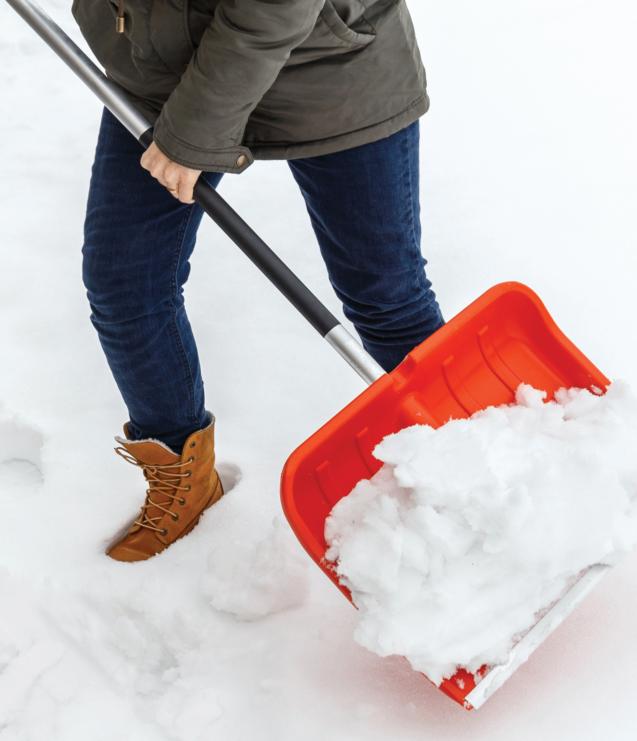
3 minute read
Shovel Smart — For Your Heart
The sudden exertions that come with shoveling snow can put a dangerous strain on your ticker. Here’s what doctors advise.
Cold weather can pose special hazards for heart health, and the classic example is shoveling snow. This deceptively simple activity (or pushing a heavy snow blower) can raise your heart rate and blood pressure more quickly and dramatically than many other types of exercise. A study in the Journal of the American Medical Association revealed that shoveling heavy snow can be more demanding on the heart than running on a treadmill. And a 2017 study in snow-savvy Canada found that hospital admissions for heart attack went up after heavy snowfalls—the heavier the snowfall, the more they rose. “Shoveling is a unique form of exertion that triggers a cardiovascular response such as an increased blood pressure and heart rate, both essential in maintaining blood flow to your heart as your muscles contract,” says Shalin P. Desai, M.D., who practices general cardiology and cardiac electrophysiology at Holy Name Medical Center in Teaneck. “What can make shoveling so dangerous is that it is performed in cold weather, which can lead to vasoconstriction, in which blood vessels narrow, reducing blood flow so that the heart’s pumping takes more effort. This, combined with a rise in blood pressure and heart rate, puts strain on the heart muscle, and increases the amount of oxygen the heart needs to function normally.”
If you have a chronic medical condition that raises your risk—or if you’re over age 55—it may be best to hire a brawny youngster down the street to do the shoveling for you. But those who do choose to shovel can protect their hearts this season by following heart-savvy advice from Dr. Desai and Nora Z. Tossounian, M.D., an internal medicine specialist with Hackensack University Medical Center.
They suggest that people limit exposure to biting cold and wind outdoors to minimize vasoconstriction. That means choosing to exercise indoors if possible. Also, keep in mind that cold-weather comfort foods such as canned soup often contain high amounts of sodium, which can exacerbate high blood pressure.
The doctors also offer these tips for smart shoveling: • Lighten loads. Push snow if possible, rather than lifting it, says Dr. Tossounian. When lifting, scoop small amounts of snow, rather than heavy piles, especially when snow is wet. • Don’t shovel on a full stomach. Allow food to settle for an hour or two after a heavy meal before heading out to the driveway. “Eating a big meal before shoveling can cause acid reflux and gas, mimicking the symptoms of a heart attack,” says Dr. Tossounian. “Instead, eat a small snack that combines protein and carbohydrates, such as half an apple with peanut butter or a few crackers with cheese.” • Shovel in shifts. Both docs say that if you’re going to shovel, do it for short periods of time to reduce the chance of strain on the heart and muscles. Adds Dr. Desai: “And take frequent breaks!” • Dress warmly. Make sure you’re “protected from the cold with warm clothes designed to stand up to frigid temperatures,” says Dr. Tossounian. • Know trouble signs. Chest discomfort sometimes—but not always—signals a heart attack. “Symptoms include chest pain or pressure that lasts a few minutes or more, which occur intermittently and may radiate to one or both arms, neck, jaw, back or stomach,” says Dr. Desai. “Knowing the symptoms of a heart attack and calling 911 if they don’t resolve could save someone’s life.”

YOUR BODY DEPENDS ON YOUR HEART—AND VICE VERSA
Doctors say you can do your heart a favor—in winter or any other time— by taking good care of the rest of you, and especially by acting to avoid infections. So be sure to: • Get vaccines. Check with your doctor to make sure you’re up to date with both COVID-19 and flu inoculations. • Wash hands regularly. Use soap and water for at least 20 seconds to reduce the spread of viruses. • Treat dry skin. Cracks in skin can become portals for germs to enter the body. • Get enough sleep. Slumber helps the body fight or fend off illness. Eight hours a night is ideal. (If you’re sleeping enough hours but waking unrefreshed, consult your doctor about being evaluated for a possible sleep disorder.) • Stay hydrated. Having enough fluid in the body helps regulate blood pressure.
• Keep a heart-healthy diet.
Emphasize whole grains, fruits and vegetables, get plenty of fiber and limit salty, sugary and fatty foods.




